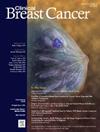Sequential Therapy With HER2 Tyrosine Kinase Inhibitors in Patients With HER2-Positive Metastatic Breast Cancer
IF 2.5
3区 医学
Q2 ONCOLOGY
引用次数: 0
Abstract
Purpose
HER2-targeted tyrosine kinase inhibitors (TKIs) tucatinib, lapatinib and neratinib are standard agents for treatments of HER2-positive (HER2+) metastatic breast cancer. Due to their penetration through the blood-brain barrier, these agents are especially beneficial for patients with brain metastases. To date, limited data exists on the sequential use of different HER2-targeted TKIs, and it is unknown if reusing the same TKI as a part of different treatment regimens provides clinical benefits.
Methods
We performed a retrospective single institution study (IRB 23-2337) and identified N = 105 patients with HER2+ metastatic breast cancer and a TKI regimen of at least 1 month. We then performed a manual abstraction to identify patients who had at least 2 TKI regimens (N = 24) and estimated time on treatment (median and range in months). Best responses to TKI treatments were evaluated by MD review. Patients were censored at the time of the last follow up when the end of treatment data were not available.
Results
In our patient cohort, 14 of 24 patients (58%) stayed on the second or third TKI regimen for greater than 6 months, and 10 of 24 patients (42%) were on the subsequent TKI regimen(s) for longer than the first one. Time on a non-TKI regimen between the first and second TKI was not associated with the duration of benefit from the second TKI.
Conclusion
Our data support using different HER2-targeted TKI regimens in sequence, offering additional effective treatment options for patients with HER2+ metastatic breast cancer, including patients with brain metastases.
HER2酪氨酸激酶抑制剂序贯治疗HER2阳性转移性乳腺癌患者
目的:靶向HER2的酪氨酸激酶抑制剂(TKIs)图卡替尼、拉帕替尼和纳拉替尼是治疗HER2阳性(HER2+)转移性乳腺癌的标准药物。由于它们能穿透血脑屏障,这些药物对脑转移患者特别有益。迄今为止,关于顺序使用不同her2靶向TKI的数据有限,并且尚不清楚重复使用相同的TKI作为不同治疗方案的一部分是否能提供临床益处。方法:我们进行了一项回顾性单机构研究(IRB 23-2337),并确定了N = 105例HER2+转移性乳腺癌患者,TKI方案至少1个月。然后,我们进行了人工抽选,以确定至少有2种TKI方案的患者(N = 24)和估计的治疗时间(中位数和范围,以月为单位)。通过MD回顾评估TKI治疗的最佳疗效。在最后一次随访时,当无法获得治疗结束数据时,对患者进行审查。结果:在我们的患者队列中,24名患者中有14名(58%)使用第二或第三种TKI方案超过6个月,24名患者中有10名(42%)使用后续TKI方案的时间长于第一次TKI方案。第一次和第二次TKI之间的非TKI方案的时间与第二次TKI的获益持续时间无关。结论:我们的数据支持按顺序使用不同的HER2靶向TKI方案,为HER2+转移性乳腺癌患者(包括脑转移患者)提供额外的有效治疗选择。
本文章由计算机程序翻译,如有差异,请以英文原文为准。
求助全文
约1分钟内获得全文
求助全文
来源期刊

Clinical breast cancer
医学-肿瘤学
CiteScore
5.40
自引率
3.20%
发文量
174
审稿时长
48 days
期刊介绍:
Clinical Breast Cancer is a peer-reviewed bimonthly journal that publishes original articles describing various aspects of clinical and translational research of breast cancer. Clinical Breast Cancer is devoted to articles on detection, diagnosis, prevention, and treatment of breast cancer. The main emphasis is on recent scientific developments in all areas related to breast cancer. Specific areas of interest include clinical research reports from various therapeutic modalities, cancer genetics, drug sensitivity and resistance, novel imaging, tumor genomics, biomarkers, and chemoprevention strategies.
 求助内容:
求助内容: 应助结果提醒方式:
应助结果提醒方式:


